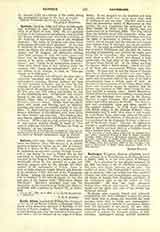

Batteux, CHARLES, abbe and writer on philosophy and aesthetics, b. near Vouziers, France, May 6, 1713; d. at Paris, July 14, 1780. He was professor at Paris of the humanities and rhetoric, then of Greek and Roman philosophy, and was made a member of the Academy of Inscriptions and of the Academie Francaise. His works on Epicurus and other Greek philosophers attracted much attention. At the time of his death he was issuing a large collection of memoirs on China; the series was continued by Brequigny and de Guignes. Of Batteux’s writings those that received at once the most praise and blame were the following three works: “Beaux-arts reduits un meme principe”, “Cours de belles-lettres”, and “Traite de la construction oratoire”. These were issued later in five volumes under the common title: “Cours des belles-lettres”, and in a new edition of six volumes, in 1824, as “Principes abreges de la litterature”.
Following Aristotle, but taking at the same time a somewhat one-sided and superficial view of the philosopher’s meaning, Batteux deduced art from the free imitation of nature, that is, from the free copying of nature in its beautiful forms. Utility is the aim of the mechanical arts; beauty, the end of the fine arts, and both utility and beauty the aim of the beautifying arts. Architecture and oratory belong to the last category. The arts aim to influence either sight or hearing and are divided, therefore, into two classes. Besides these the rhythmical arts, music and dancing, and, in addition, painting and poetry are closely related to one another. In these writings there is a lack of comprehensive definitions of the different arts; those given are often inexact and uncertain. Nevertheless, Batteux may be regarded as the real founder of aesthetics in France. Of his works devoted exclusively to rhetoric and poetry mention should be made of “Les quatres poetiques d’Aristote, d’Horace, de Vida, et de Boileau” in two volumes.
G. GIETMANN

